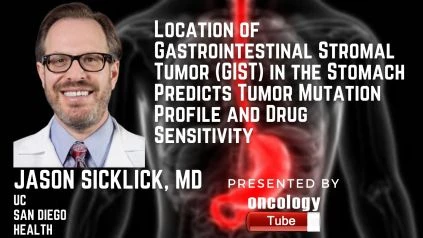Jason Sicklick, MD, Surgical Oncologist, Associate Professor of Surgery at UC San Diego Health speaks about Location of Gastrointestinal Stromal Tumor (GIST) in the Stomach Predicts Tumor Mutation Profile and Drug Sensitivity.
Link to Abstract:
https://clincancerres.aacrjournals.org/content/early/2021/07/28/1078-0432.CCR-21-1221.abstract
Abstract – Goals:
GISTs (gastrointestinal stromal tumors) are tumors that develop in various parts of the stomach and are caused by a variety of mutations (most often in KIT, PDGFRA, and SDHx). The anatomic location of gastric GIST is thought to be linked to different genomic profiles and driving mutations.
Design of Experiments:
In the National Cancer Database (NCDB), we evaluated KIT versus non-KIT status with tumor site in 2,418 individuals with primary gastric GIST. We also evaluated sequencing findings, cross-sectional imaging, and surgical reports for a 236-patient international cohort (TransAtlantic GIST Collaborative, TAGC). For tumors situated proximally versus distally, subgroup analyses were undertaken. Multivariate regression analysis was used to identify risk variables for KIT versus non-KIT cancers. The significance of features was then determined using a random forest machine learning model.
Results:
Non-KIT mutations dominated distant tumor sites in the NCDB cohort (P 0.03). In the TAGC cohort, proximal GIST was virtually completely KIT mutant (96 percent), but distal GIST was 100 percent PDGFRA and SDH mutant. Tumor location was linked to KIT versus non-KIT mutations in multivariate regression analysis. Stomach position was the most critical characteristic for predicting mutation status using random forest machine learning research.
Conclusions:
The mutational landscape of gastric GIST is connected to the tumor site for the first time, according to our findings. Regardless of shape or age, proximal gastric GIST is predominantly KIT mutant, but distal tumors have a wide range of non-KIT genetic diversity. When resources are limited, the anatomic site of stomach GIST may give urgent direction for clinical treatment options and selected confirmatory genetic testing.

